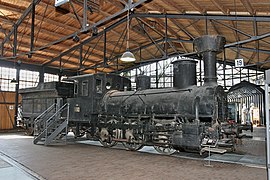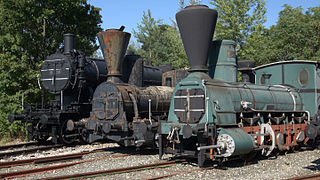Südbahn Class 23 (old)
This article includes a list of general references, but it lacks sufficient corresponding inline citations. (January 2015) |
| SB 23 (alt), 29 BBÖ 49 / JDŽ 124 / MÁV 332 / FS 193 ÖBB 153 | |||||||||||||||||||||||||||||||||||||||||||||||||
|---|---|---|---|---|---|---|---|---|---|---|---|---|---|---|---|---|---|---|---|---|---|---|---|---|---|---|---|---|---|---|---|---|---|---|---|---|---|---|---|---|---|---|---|---|---|---|---|---|---|
 GKB 671, ex BBÖ 49.03, ex SB 671 | |||||||||||||||||||||||||||||||||||||||||||||||||
| |||||||||||||||||||||||||||||||||||||||||||||||||
| |||||||||||||||||||||||||||||||||||||||||||||||||
The steam locomotives of Südbahn Class 23 (old) were goods train engines worked by the Austrian Southern Railway (österreichische Südbahn).
History
[edit]The precursors to the Austrian Southern Railway had a very disparate fleet of goods locomotives. The Southern Railway therefore had a six-coupled freight locomotive developed which was based the French Bourbonnais prototype. This series was initially given the designation 23, but was reclassified to 29 in 1864. The Lokomotivfabrik der StEG engine works delivered 20 units in 1860, which proved themselves so well that a total of 205 were built up to 1872 by this factory along with the Wiener Neustädter Lokomotivfabrik and Maschinenfabrik Esslingen.
Modifications
[edit]Over time there were several modifications, such as the driver's cab in 1861 and adding vacuum brake with sound absorbers and new boilers in the 1880s.
Dispersal
[edit]After nationalisation in 1924 the Federal Railway of Austria (BBÖ) took over 47 units, that were grouped into BBÖ Class 49. After the Second World War a few engines, classified by the Deutsche Reichsbahn as DRB 53.7111–7116, remained in Austria. Of these, the ÖBB only took over number 153.7114 but withdrew it in 1953.
Yugoslavia
[edit]Yugoslavia designated the locomotives that it received as JŽ 124.[1]
Hungary
[edit]In Hungary they became MÁV 332.
Italy
[edit]In Italy they became FS 193.
- Locomotives in FS Class 193
| FS number | New SB number | Builder | Date built | Date scrapped |
|---|---|---|---|---|
| 193.001 | 29.799 | StEg | 1867 | 1928 |
| 193.002 | 29.800 | StEg | 1867 | ? |
| 193.003 | 29.801 | StEg | 1867 | ? |
| 193.004 | 29.802 | StEg | 1867 | ? |
| 193.005 | 29.803 | StEg | 1867 | ? |
| 193.006 | 29.804 | StEg | 1867 | ? |
| 193.007 | 29.806 | Sigl | 1867 | ? |
| 193.008 | 29.811 | Sigl | 1867 | ? |
| 193.009 | 29.812 | Sigl | 1867 | ? |
| 193.010 | 29.813 | Sigl | 1867 | ? |
| 193.011 | 29.784 | StEg | 1866 | ? |
| 193.012 | 29.785 | StEg | 1866 | ? |
| 193.013 | 29.786 | StEg | 1866 | ? |
| 193.014 | 29.787 | StEg | 1866 | ? |
| 193.015 | 29.805 | Sigl | 1867 | 1928 |
| 193.016 | 29.788 | StEg | 1866 | 1928 |
| 193.017 | 29.789 | StEg | 1866 | ? |
| 193.018 | 29.790 | StEg | 1866 | ? |
| 193.019 | 29.791 | StEg | 1866 | 1928 |
| 193.020 | 29.792 | StEg | 1866 | ? |
| 193.021 | 29.793 | StEg | 1866 | ? |
| 193.022 | 29.794 | StEg | 1866 | ? |
| 193.023 | 29.795 | StEg | 1866 | 1928 |
| 193.024 | 29.796 | StEg | 1866 | 1928 |
| 193.025 | 29.797 | StEg | 1866 | 1928 |
| 193.026 | 29.798 | StEg | 1866 | 1928 |
Preservation
[edit]Five members of the class are preserved.
During the 1920s the BBÖ sold several engines to the Graz-Köflacher Bahn (GKB). Three of them, built in 1860, were preserved alongside two other Class 23:
- One of them, number GKB 671, is still working today, albeit with some small modifications such as compressed-air brakes thanks to the work of the Steirischen Eisenbahnfreunde (Styrian Railway Society). Built in 1860, the Austrian-made Südbahn Class 23 (old) locomotive on the Graz-Köflach railway (GKB), is the longest serving steam engine in the world. It is frequently on duty and is used to haul steam specials.
- GKB 674 ex Südbahn 674,[2] has been preserved by the Budapest transport museum and restored with its early roofless drivers cab.
- GKB 680 now belongs to the German Museum of Technology in Berlin.[3]
- Südbahn 718, used by Yugoslav railways, resides in the Slovenian Railway Museum. Built in 1861, was restored with Südbahn livery and an open-top cab.
- Südbahn 852, used by ÖBB until 1958, is awaiting restoration, tenderless, at heizhaus Strasshof.[4][5]
-
GKB 671 in 2017.
-
Südbahn 674 in Budapest.
-
GKB 680 in Berlin.
-
Südbahn 718 in Ljubljana.
-
Südbahn 859, behind a Kaiserin Elisabeth Bahn locomotive.
See also
[edit]References
[edit]- ^ "JŽ lokomotiva serije 124", www.miniaturna-zeleznica.com (in Slovenian)
- ^ "Austrian Steam Base". www.dampflok.at. Retrieved 2020-06-29.
- ^ "Austrian Steam Base". www.dampflok.at. Retrieved 2020-06-29.
- ^ "R2285. J. HASWELL at Linz. 31st May,1965". 31 May 1965.
- ^ "SB 29 852 - Eisenbahnmuseum "Das Heizhaus" Strasshof". eisenbahnmuseum-heizhaus.com. Retrieved 2020-06-29.
Literature
[edit]- Dietrich, Herbert (1994). Die Südbahn und ihre Vorläufer. Wien: Bohmann Verlag. ISBN 3-7002-0871-5.
- Griebl; Slezak; Sternhart (1985). BBÖ Lokomotiv-Chronik 1923–1938. Verlag Slezak. ISBN 3-85416-026-7.
- Hütter, Ingo (2012). Die Dampflokomotiven der Baureihen 50 bis 53 der DRG, DRB, DB, und DR (in German). Werl: DGEG Medien. pp. 429, 433. ISBN 978-3-937189-63-5.
- Schmeiser, Bernhard (1992). Lokomotiven von Haswell, StEG und Mödling 1840–1929. Wien: Nachdruck: Verlag Slezak. ISBN 3-85416-159-X.
- Schröpfer, Heribert (1989). Triebfahrzeuge österreichischer Eisenbahnen - Dampflokomotiven BBÖ und ÖBB. Düsseldorf: alba. ISBN 3-87094-110-3.
- Stocklausner, Johann (1979). Dampfbetrieb in Alt-Österreich. Wien: Verlag Slezak. ISBN 3-900134-41-3.
- Tezak, Sepp (September 2003). "Wiederinbetriebnahme 671". Der Fahrtwind (50). Graz: Steirische Eisenbahnfreunde/Club U44: 3–7.
- Zoubek, Dieter (2004). Erhaltene Dampflokomotiven in und aus Österreich. Eigenverlag. ISBN 3-200-00174-7.
- Austrian Southern Railway Company steam locomotives
- Steam locomotives of Hungary
- 0-6-0 locomotives
- Railway locomotives introduced in 1860
- Steam locomotives of Germany
- Freight locomotives
- Standard gauge locomotives of Austria
- Standard gauge locomotives of Yugoslavia
- Standard gauge locomotives of Hungary
- Standard gauge locomotives of Italy
- Standard gauge locomotives of Germany
- C n2 locomotives
- Lokomotivfabrik der StEG locomotives
- Wiener Neustädter locomotives
- Esslingen locomotives





